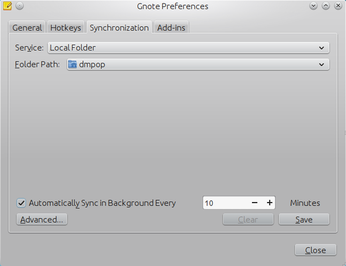Gnote Now Supports Synchronization

Productivity Sauce
Gnote has always been an excellent Mono-free alternative to the popular Tomboy note-taking application, but it lacked one crucial feature: the ability to synchronize notes across multiple machines. Fortunately, the latest developer release of the application fills the gap and introduces syncing functionality. The synchronization feature is still under development, but if you are comfortable with using beta software and you happen to use an Ubuntu-based distro, you can install the latest experimental version of Gnote from the project's PPA. To do this, use the following commands:
sudo apt-add-repository ppa:gnote/ppa-experimental sudo apt-get update && sudo apt-get install gnote
Launch the application, choose Gnote | Preferences, and switch to the Synchronization section. Gnote currently supports two synchronization methods: local folder and WebDAV. If you are using a file syncing service like Ubuntu One, Dropbox, or ownCloud, you can create a separate folder for use with Gnote and use the local folder synchronization method to keep notes in sync. Since solutions like ownCloud also support the WebDAV protocol, you can configure Gnote to use it for synchronizing notes. In the Synchronization section, you can also enable the automatic syncing at specified time intervals and configure the way Gnote handles synchronization conflicts.
comments powered by DisqusSubscribe to our Linux Newsletters
Find Linux and Open Source Jobs
Subscribe to our ADMIN Newsletters
Support Our Work
Linux Magazine content is made possible with support from readers like you. Please consider contributing when you’ve found an article to be beneficial.

News
-
LibreOffice 26.2 Now Available
With new features, improvements, and bug fixes, LibreOffice 26.2 delivers a modern, polished office suite without compromise.
-
Linux Kernel Project Releases Project Continuity Document
What happens to Linux when there's no Linus? It's a question many of us have asked over the years, and it seems it's also on the minds of the Linux kernel project.
-
Mecha Systems Introduces Linux Handheld
Mecha Systems has revealed its Mecha Comet, a new handheld computer powered by – you guessed it – Linux.
-
MX Linux 25.1 Features Dual Init System ISO
The latest release of MX Linux caters to lovers of two different init systems and even offers instructions on how to transition.
-
Photoshop on Linux?
A developer has patched Wine so that it'll run specific versions of Photoshop that depend on Adobe Creative Cloud.
-
Linux Mint 22.3 Now Available with New Tools
Linux Mint 22.3 has been released with a pair of new tools for system admins and some pretty cool new features.
-
New Linux Malware Targets Cloud-Based Linux Installations
VoidLink, a new Linux malware, should be of real concern because of its stealth and customization.
-
Say Goodbye to Middle-Mouse Paste
Both Gnome and Firefox have proposed getting rid of a long-time favorite Linux feature.
-
Manjaro 26.0 Primary Desktop Environments Default to Wayland
If you want to stick with X.Org, you'll be limited to the desktop environments you can choose.
-
Mozilla Plans to AI-ify Firefox
With a new CEO in control, Mozilla is doubling down on a strategy of trust, all the while leaning into AI.

